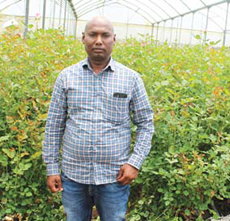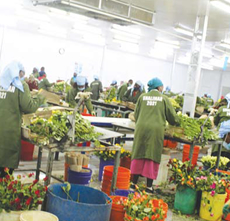By Mary Mwende Mbithi
 On the shores of Lake Naivasha, off North Lake Road in Kasarani area of Naivasha in Nakuru County lies a magnificent, well maintained farm with landmark, conspicuous greenhouses. Shalimar Flower Farm, a hotbed of horticulture thriving in Avocado and cutflower growing.
On the shores of Lake Naivasha, off North Lake Road in Kasarani area of Naivasha in Nakuru County lies a magnificent, well maintained farm with landmark, conspicuous greenhouses. Shalimar Flower Farm, a hotbed of horticulture thriving in Avocado and cutflower growing.
Inception and Production
The farm was started in 2002 on a 350 acre piece of land. It is one of the four farms enshrined under the umbrella of Shalimar Flowers (K.) Limited, (previously East Africa Growers). Having expanded from the initial 30 hectares, it currently, runs on 34 hectares massive piece of land. Shalimar Flowers (K.) Limited grows over 40 varieties of Roses mainly the T-Hybrid, Premium and Spray intermediate roses. ( in different farms ) They have incorporated the hydroponics system in their production. They also grow other flowers such as Gypsophilla, Solidago, Lipiedium, Chrysanthemum, Eucalyptus and Gerbera. They are also preparing to introduce Astroemeria and Hypericum flowers in their farms.
Affiliation of Shalimar farm to other farms
Shalimar farm has three sister-farms under the Shalimar Flowers (K.) Limited umbrella. They are; Shalimar-Mahee in Ol-Kalau, Shalimar – Mwanzi in Rumuruti and Shalimar- Kabuku in Thika. These three farms occupy an extensive chunk of land of about 20 hectares per farm in their respective regions.
Choice of Locality
According to the Group General Manager of Shalimar Flowers (K) Ltd., Mr. Natarajan, Many considerations were explored in setting up Shalimar farms. Among them were the climatic conditions, water, availability of land, manpower and accessibility.
“For instance Shalimar farm is in Naivasha, Rift Valley region. In this area, the volcanic soils in Rift Valley which resulted from the rift valley formation a million years ago are said to be fertile. There is also availability of Fresh water from the lake. The proximity of Naivasha to the equator means sunny days and cool nights that give an optimal climate for flowers to flourish.” Said Mr. Natarajan.
Human Resource
Shalimar Flowers (K.) Limited has a workforce of over 2000 employees. The General Manager, Mr. Natarajan sits at the helm of the four farms (Shalimar Flowers (K.) Limited). There are four farm managers stationed at respective farms under the Shalimar group as follows; Mr. Ram Mwanzi Farm, Mr. Kirthan Mahee Farm, Mr. Mohan Raj Kabuku Farm and Mr. Dinkar Wandhekar Shalimar farm.
The others in the leadership positions are the, Production managers, Supervisors among others. There are Human Resource offices in each farm with the group HR based in Nairobi.
Pests and diseases control
To keep their flowers pestfree, Shalimar farms have covered their greenhouses with insect proof nets on sides and vents. They also manage damaged structures to prevent insects and pests from outside. There is also the utilization of the biological control to mitigate the pests and diseases. Scouting and staff training is also incorporated for early identification of diseases and pests.
Post-harvesting
Shalimar Farm does flower processing on site after harvesting. They have internal pack houses and cold rooms which enable them to package the flowers into desired specifications (such as bouquets) for the end consumer. This means they export ready to use products.
Market and customer satisfaction
Shalimar Flowers (K.) Ltd exports their flowers to the European Union. They are 100% direct market with all their flowers being sold directly to supermarkets. The group has constantly worked hard to maintain the quality of their flowers and a consistent supply chain in order to fulfill their customer needs.
Challenges
Farm inputs are getting expensive day by day. This together with hiked electricity charges are proving a thorn in the eye of the flower industry and so does shalimar. In addition, government can also hasten VAT refunds.
Environmental Sustainability  Waste management is categorized into two; liquid and hard stuff. On the liquid waste, Shalimar is focused on ensuring ecologically sustainable flower farming. Fertilizer leaching is minimal thus less pollution to the environment. They recycle their water with the clean water released back to the farm.Shalimar Flowers uses mostly ecofriendly chemicals leading to minimal pollution of the environment.
Waste management is categorized into two; liquid and hard stuff. On the liquid waste, Shalimar is focused on ensuring ecologically sustainable flower farming. Fertilizer leaching is minimal thus less pollution to the environment. They recycle their water with the clean water released back to the farm.Shalimar Flowers uses mostly ecofriendly chemicals leading to minimal pollution of the environment.
Management of the hard stuff is superb in that there is utmost segregation of both the biodegradable and non-biodegradable waste. The biodegradable is composited while the non-biodegradable is collected by an outsourced waste collector for correct disposal. Tree planting is also exercised with the farm.
Corporate Social Responsibility (CSR) Just like Janie Lewis, an author once wrote; ‘we have a social responsibility, a constitutional opportunity and a moral obligation to help others.’ The emphasis placed by more and more companies on corporate social responsibility symbolizes the recognition that prosperity is best achieved in an inclusive society. Shalimar Flowers (K.) Ltd is actively involved in CSR.
They are supporting school feeding programs in the region, availing social amenities like a playground they bought for a neighbouring school- St. Andrew’s High School, cleaning hospitals, connecting clean piped water to the community as well as harvesting rain water that is usually released for use to the community.
Employees’ welfare
The farm prides itself as being Global Gap, Mps, ETI and Fair Trade certified. Shalimar Flowers (K.) Ltd treats its employees with utmost dignity in order to maintain and improve their output.
Through the Fair trade, the farm gives bursaries to its employees’ school going children. Workers are also supported in paying college fees to accomplish their dreams. They are also provided with housing facilities, registered in the company Sacco and given access to low interest loans.
Covid-19 and the flower industry
Shalimar Flowers (K.) Ltd was among the many companies that experienced the biting jaw of the pandemic. On the early stages of its onset, the entire flower industry was shaken. Shalimar was prompted to adjust to the new normal. This saw the downsizing of man-power and cutting on production costs. After a while the situation became a norm and as the other farms were readjusting, so was Shalimar. So far the industry is thriving uninterruptedly amidst the pandemic.
Future prospects
Shalimar Flowers (K.) Ltd, aspires to expand on both variety and hactareage. They are working on growing more flower varieties and creating additional 15 hectares in future. It is the will and wish of every organization to endeavor to do their best, and Shalimar is no exception. “Customer satisfaction remains a key area of focus for the farm.” Concluded Mr. Natarajan.
